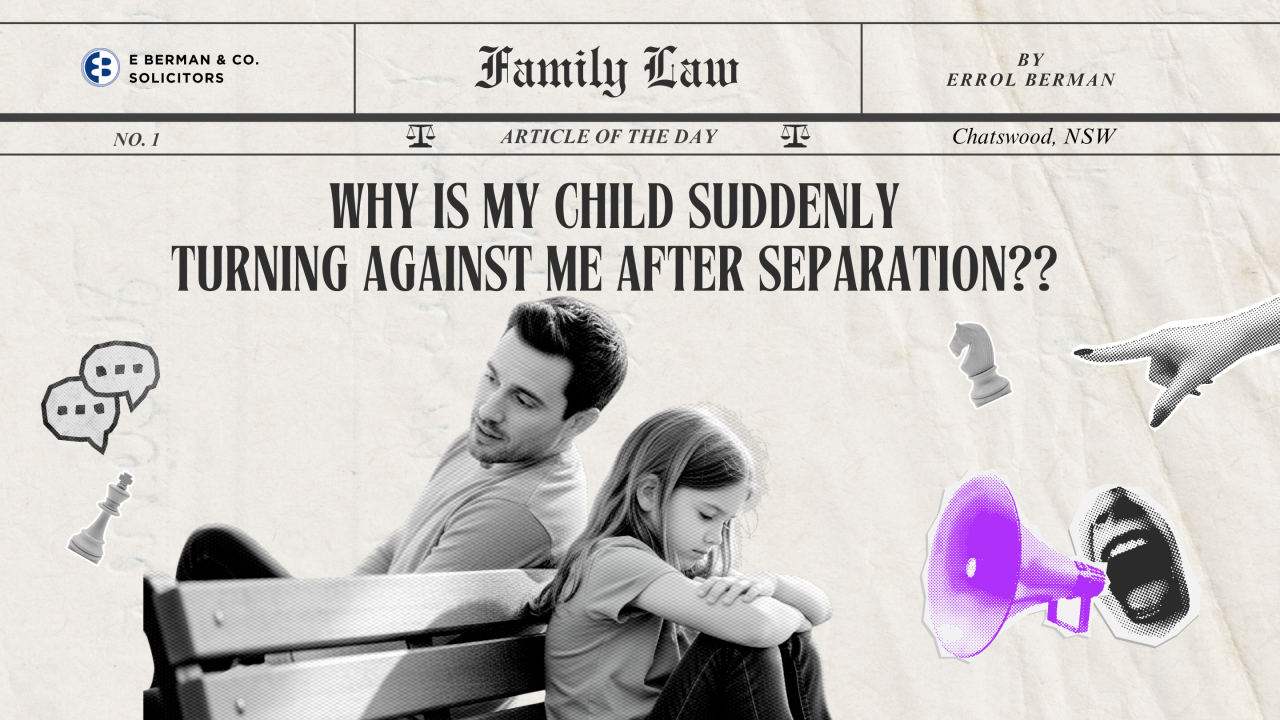
What is Parental Alienation?
Introduction
Following separation, the welfare of your children is of paramount concern. If your partner becomes the child’s primary carer, and you have a toxic relationship with them, there is a real worry about the potential for parental alienation. This means your child may be manipulated into unjustifiably believing that you are no good for some reason, and the child then resists contact with you as a result. It is essential you realise the signs of alienation early to attempt to “nip it in the bud” before it is too late. The longer the situation continues the more difficult it becomes to reverse your child’s thought pattern.
What is Parental Alienation?
Parental alienation is the process where one parent, usually the primary carer, influences a child to make you public enemy number one. This can occur through direct or indirect action, and may result in a change in your relationship with your child to the extent the child may not wish to spend time with you any longer, or when you are together, the relationship becomes strained as your child’s attitude towards you is no longer loving or even amicable, as existed previously.
Key Indicators of Parental Alienation
Sudden Change in the Child’s Attitude
If you notice an unexplained shift in your child’s behaviour towards you, such as hostility or refusal to communicate, these could be the first signs of alienation, particularly if you had a good relationship with the child previously.
Use of Adult Language or Concepts
If your child begins to use language or make statements that are untypical and beyond the child’s age or maturity, this may be indicative of feedback or blatant influence from the primary carer.
Unfounded Allegations
Your child may make statements about you that have no basis and have not been mentioned previously and may echo the sentiments of the primary carer, such as you are a bad father.
Bias
If your child expresses only negative feelings about you, especially if this is contrary to the child’s character, it may be a tell-tale sign of alienation.
Rejection of Your Extended Family
Alienation can extend to your relatives. If the child suddenly refuses contact with any members of your family, this may be part of the alienation process.
No Guilt
A child who shows no remorse or guilt about mistreating or rejecting you may be under the influence of alienating behaviour.
Siding with the Primary Carer
If your child sides with the primary carer in disputes irrespective of the subject, the child would be echoing the position of the primary carer.
Steps to Take
Keep Records
If you observe all or some of the above indicators, it is essential to document all relevant incidents and maintain detailed records of your interaction with your child.
Avoid Arguments
You should avoid any arguments with your child if possible, particularly if the child is old enough or sensitive, as it will not have any positive impact on your child and your relationship with the child.
Seek Professional Assistance
You need to seek the assistance of a family consultant, psychologist, or other qualified professional to assess the situation if possible. Early intervention can be critical to address the alienation and preserve the relationship with your child.
Conclusion
Parental alienation is a complex issue that can have lasting effects on children and families. By remaining vigilant for the signs such as outlined above, you may be able to take proactive steps to deal with alienation before it is too late. However, the attitude of your child and the steps you need to take may to a large extent depend on the age and maturity of the child that has been alienated. If you need further guidance on this complex issue we are only a phone call or email away.
Tel: 02 9412 2493
Email: errol@ebandco.com.au
Disclaimer
The information provided in this blog article is for general informational purposes only and does not constitute legal advice. While every effort has been made to ensure the accuracy and currency of the information, laws and regulations may change, and the application of law can vary depending on individual circumstances. Readers should not act or refrain from acting based on any content included in this article without seeking appropriate legal or other professional advice specific to their situation. The author Errol Berman and E Berman & Co expressly disclaim all liability in respect of actions taken or not taken based on any or all the contents of this article. No solicitor-client relationship is created by reading or relying on the information in this article. For advice regarding your circumstances you should contact a qualified legal practitioner.
